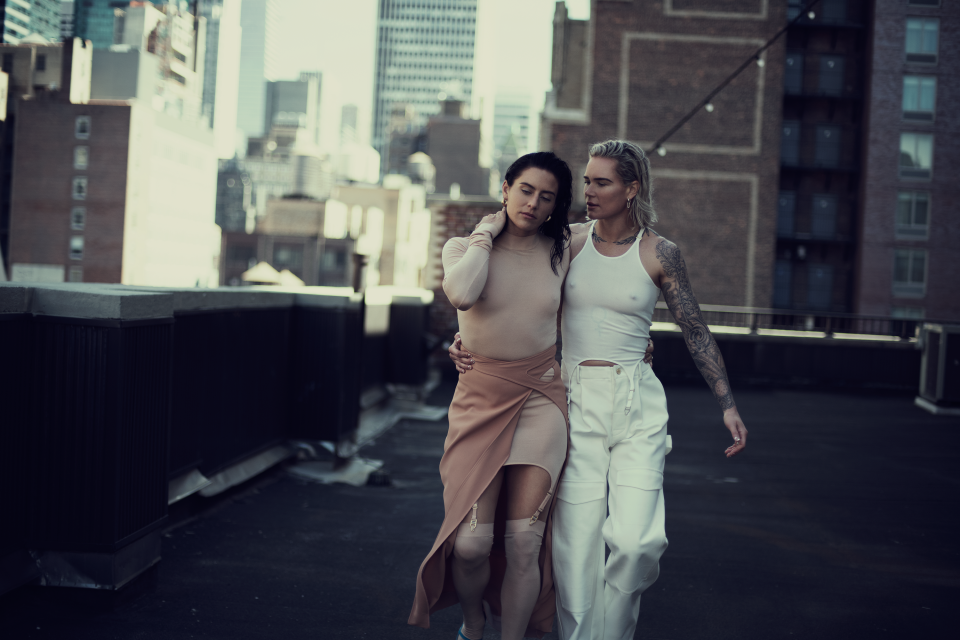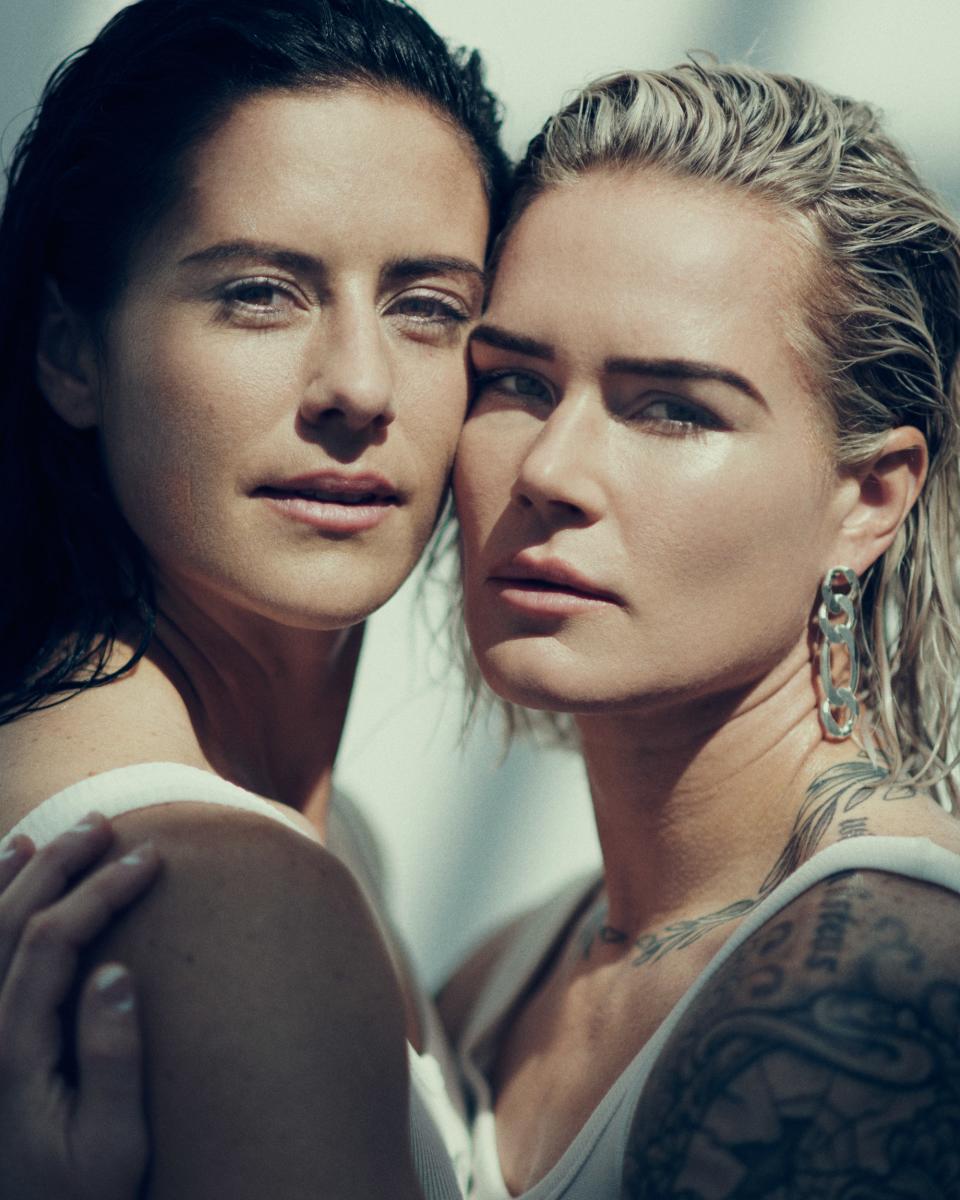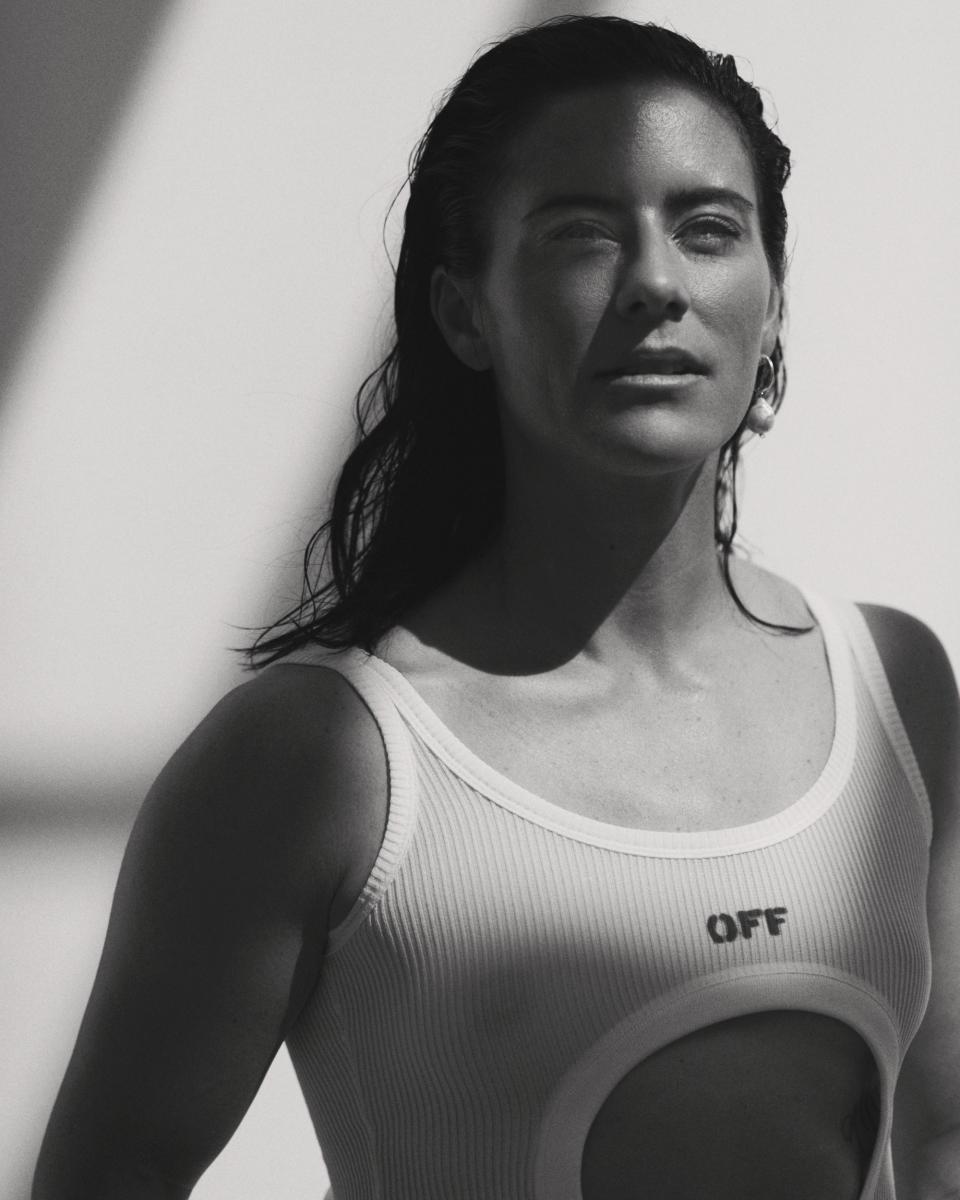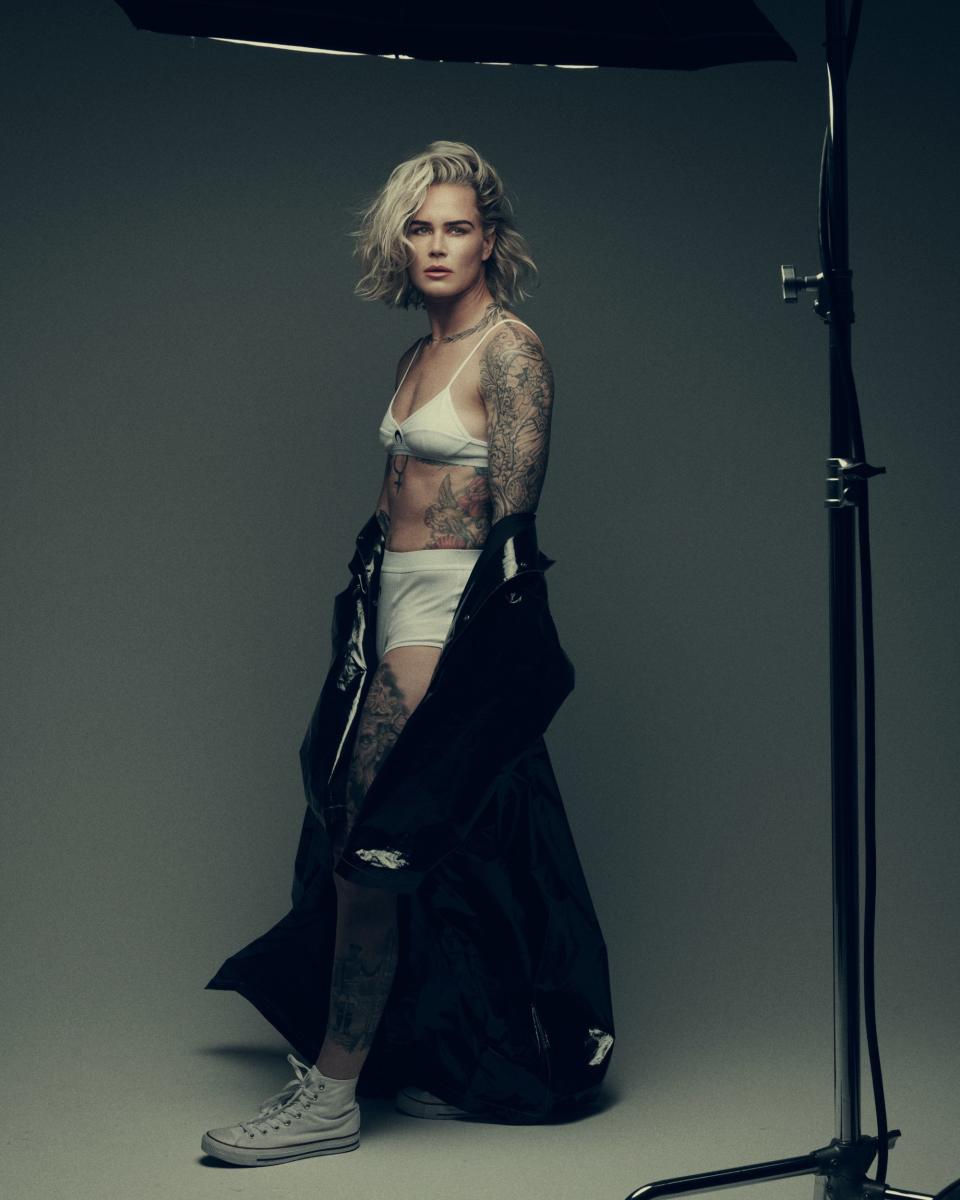Ali Krieger and Ashlyn Harris Are Plotting Their Future
One year ago, almost to the day, was the first time I saw Ali Krieger and Ashlyn Harris in person. It was July 2019 in New York City, which now seems like another planet in another century. The U.S. Women's National Team (USWNT) had just won soccer's World Cup, a feat they'd accomplished for two tournaments running, and my city was honoring the champions with a ticker-tape parade.
The streets were squirming with humanity, children on shoulders, between legs, and straddling blockades, all craning to see through the paper snow that coated everything. And unmistakable in their Grecian posture came the women on their floats: team co-captain Megan Rapinoe, with her iced-lavender hair; goalie Harris, wearing dark sunglasses, with her phone held aloft to capture us; her fiancée, defender Krieger, with her ballerina bun; the whole team wearing blue and gold medals around their necks, radiating joy.

Up On the Roof
Ali Krieger, left, with Ashlyn Harris in New York City, March 14, 2020— several days before the state's stay-at-home order went into effect. On Krieger: Dion Lee dress and skirt. Gaviria earrings. On Harris: Dion Lee top and pants. Martine Ali earrings. Makeup colors, on both: Easy Breezy Brow Draw & Fill in Soft Brown, Full Spectrum Sculpt Expert Bronzer in Sunlight, and Exhibitionist Demi Matte Lipstick in Streaker by CoverGirl. Fashion stylist, Henna Koskinen. Hair: Rolando Beauchamp. Makeup: Maki Ryoke. Manicures: Naomi Yasuda.
What's important to understand about the USWNT is that they are more than a sports team; they are a movement. Their fight for equal pay is historic, as is their record of wins (four Olympic gold medals, four World Cups). But their sheer charisma is what keeps the fans engaged. Harris and Krieger are an integral part of that. We see their fallibility, their love, their mirth and sass, all interspersed with a bone-deep drive to win. In a time when women have taken knocks again and again in politics, business, and culture, here are women who win — and keep winning. On that day last summer, fans shouted with excitement as the air around these women swirled with confetti and hope, buoyed by our collective breath. If it's not clear, we hadn't heard of COVID-19 yet.
In mid-March of this year, Krieger and Harris become the last people I am in close proximity to, or eat with in public, before the New York I knew is put into a deep hibernation. When they walk into the nearly empty restaurant of their hotel, there's plenty of other news to discuss. Carlos Cordeiro, the president of the U.S. Soccer Federation (USSF), the organization that the team is suing for equal pay, had just resigned after the USSF filed a motion in court attempting to justify the outsize compensation for male players: They require more "responsibility" along with "speed and strength" than female players. This demeaning message was delivered around the time of International Women's Day and just before the SheBelieves soccer tournament, a game the USWNT played — and won — against Japan, while wearing their shirts inside out to hide the federation's logo.
As we sit down well within six feet of one another (within two feet, really), I admire my subjects' perfectly slouched sweats (Nike on Krieger and Thom Browne on Harris), and the kind of delicate diamond jewelry that makes you wonder if you could pull off single-star hoop earrings or a pavé chain. Their comfort in themselves, and in their bodies, is palpable.

They Do
Krieger and Harris walked down the aisle in December 2019. Their wedding video has been viewed over one million times. Martine Ali earring. Makeup colors, on both: Brow Extensions Fiber Pomade Crayon in Black Brown, Lash Sensational Mascara in Midnight Black, and Baby Lips Moisturizing
Lip Balm in Quenched by Maybelline New York.
On her Instagram Live, Harris debuted a larger-than-life personality after the 2019 World Cup victory. We knew her panther-like goalie crouch, but now she came to us from locker rooms and team after-parties. From the inner sanctum, she put her 1970s movie-star face close to the phone's camera lens, and took us all along for the ride.
"With baseball and football teams, you always see behind the scenes of the players just having a good time," says Harris. "I was like, ‘Our team is going to be monumental. People need to see this.'" People saw a goggled Rose Lavelle, who had just scored the winning goal, getting down, beer in hand; Krieger, with her thick hair accented with silly string, cheering along; and Rapinoe spraying everyone with champagne. "People think we're just the straight and narrow team who's fighting for equality," says Krieger. "Now everyone knows we can party too."
Based on their social media presence, it might seem that this is a couple that shares compulsively. In person, however, Harris is sensitive, sincere, deliberate, and soft-spoken; she clearly delineates her joking asides with the adopted Valley girl-esque speech patterns of any person she is skewering. Krieger, more outgoing at first, is solicitous of her wife, serious but relaxed, and quick with a laugh, eyes flashing behind her perfectly lined lashes. For a couple who spend so much time together, in work and in life, Harris and Krieger are sweet with each other. They don't make jokes at the other's expense; they let each other finish their thoughts; and they seamlessly weave compliments throughout their conversation. They have been together for 10 years, but spent many of them playing for teams in different cities, which wasn't sustainable. For two years, Krieger was off the USWNT, before winning back her spot.
Their soccer community is a beautiful thing, but has its drawbacks. "The team comes first," says Harris. "We actually don't [often] stay in the same room [on the road]. If we are in the same room, we're in separate beds because sleep is a huge part of our recovery. I think that's the hardest part. We don't get really good time together. We have to make time even though we see each other all the time. It's tricky."
Soccer is a staple of suburban American youth, but it has never taken hold in the U.S. the way it pumps through the blood of the rest of the world. Maybe that's because we didn't have the right team before. Now the 23-member USWNT sells out stadiums and generates millions of dollars for their governing body (much more than their male counterparts). Their home jersey is the number one selling soccer jersey, regardless of sex, ever sold on Nike.com in one season.
But now all of that is on hold. With the Olympics rescheduled for 2021, and the future of sports as we know it up in the air, the path forward for these women, once crystalline sharp, is suddenly foggy. And that haziness extends to their pay equity lawsuit, which suffered a major blow in a May court ruling. The women had sued the USSF for nearly $67 million, which an expert calculated was the amount, plus damages, they were underpaid based on what the men's team would have made had they achieved the same level of success. A judge rejected that argument.
"We're all still committed and it's the same hope and dream," says Rapinoe, one of the most prominent members of the team to sign on to the lawsuit. "And that's really just for fairness. This team has been fighting for so long with the federation about equal pay."
"At the end of the day, we play a game," says Harris. "What really moves a lot of us is changing the conversation, the culture. You're playing for more than the popularity of your sport. You're playing to impact people's lives across all industries. We're trying to empower people to feel strong enough to stand for something that is important to them. And right now, for us, that is pay equity."
In the 1970s, tennis legend Billie Jean King successfully fought for women to earn equal prize money as men in mixed tournaments. She founded the Women's Sports Foundation and the Women's Tennis Association, and received the Presidential Medal of Freedom in 2009 for her work. Venus Williams lobbied Wimbledon until the women's prize money matched that of the men's contest. Wage equality in sports — whether it's the U.S. Women's Hockey team or big-wave surfers — has been debated over and over and over again. "We get on the field and do a job. And do it really well. And thrive under that type of pressure, and can be super calm in it," says Krieger. "But after the 90 minutes, we're back to fighting [for pay equity] again. We do the fighting on the field. And we're very successful, which helps our cause even more."
"What really moves a lot of us," says Harris, "is changing the culture."
Soccer, like all team sports, is about accountability. It's about testing your limits and going beyond them, all according to the laws of the game. Is it any surprise that some of the world's best athletes would notice the slant in their field and demand that it be evened out, and express moral outrage that it is uneven to begin with? The accomplishment of the USWNT, perhaps above all else, is making us, the fans, feel like we're in this fight together. That we are all welcome to come kick it in the locker room, or on the tour bus. And that is deliberate. "I know what it's like to not have a community and not be a part of something," says Harris, who played for boys' teams, until age 15, while growing up in Florida.
"It's all about visibility and what you see," she says of her early years. "We saw Michael Jordan. We saw Tony Hawk. We saw Shaquille O'Neal. Penny Hardaway. What was visible to me is what I envisioned I could become, never anything related to a female. I know that what I've strived to do from the beginning is to create a safe place where people feel a part of something." To that end, they put in the hours. "It's my duty, I think, to appreciate the fans and to keep making them want to come back," says Krieger, who notes that the team stays — or used to stay — for hours after games to sign autographs and take photos. "We need them to love the sport and to continue to show up for us, because it's only going to help the game grow."

The Long Game
Krieger's (and Harris's) ambitions go far beyond the soccer pitch. Off-White c/o Virgil Abloh top. Alighieri earrings.
Harris and Krieger, who went public with their relationship last year, got married in December in Miami (both women also play for the Orlando Pride) at an event that was covered by outlets as disparate as ESPN and Vogue, and was referred to lovingly as "the Royal Wedding" by at least one guest. "Originally, we just wanted to have a private ceremony," says Krieger. "We were like, ‘Let's save our money and worry about our future kids' education.' And it ended up being like, ‘Listen, let's share our love with the world. We can make this [wedding] an event for our community.' Sometimes I did feel like, ‘What are we doing?' But no, we're saving people's lives [with our visibility], and that's what matters most. We can put our privacy aside for a moment and just be like, ‘This is worth it.' "
Harris wore a beaded Thom Browne tuxedo; Krieger wore a long-sleeve, open-back, white gown and glossy extensions that brought her hair almost to her waist. Both had perfectly smoky eyes and utterly incandescent skin. The wedding — selections of which were shared via a moodily lit YouTube video, viewed over one million times — included a reading from the Supreme Court ruling that legalized same-sex marriage nationwide, and dinner tables at the reception were named after gay rights icons such as Marsha P. Johnson. The rainbow cake might have been a step too far into Pinterest land, but then the best man, Krieger's brother, Kyle, got up to speak and any hypothetical eye rolls turned into tears: "You guys are like a beacon of light for all young LGBTQ women and men, who just need someone to look up to. Like, we get happy endings too. In the media and the movies, so often, queer stories have a devastating ending, but not here. In real life, we get to see you guys live the dream."

Think Ink
Harris's body art is a work in progress. She says of the inspiration behind some of her tattoos: "I am obsessed with sharks and Greek mythology and the ocean." Marine Serre top, bottoms, and coat. Converse sneakers. Makeup colors: Defining Eyeliner in Hammered Bronze, All Aglow Bronzer & Highlighter Stick in Golden Shimmer, and Lip Shimmer in Peony by Burt's Bees.
Their dream has taken the shape of two large dogs, Storm and Logan (because...well, if you're not a fan of X-Men it doesn't matter), a house in Florida, and long, wine-filled dinners, just the two of them, laughing, joking, and plotting their long-term fight for visibility and equality. "Sometimes, when we go to bed, we will say, 'What was your favorite part of today?' or 'What do you want to accomplish tomorrow?' This is a good way to check in," says Krieger. "Ali and Ashlyn live their life in celebration, the way that they want to," says Rapinoe, who was a best woman at their wedding, and met Harris at camp when they were 16. "They refuse to have anybody tell them how they're going to live or what's going to make them happy or who they are or what they can be. They both have such a heart for people that are struggling. I think they have both struggled themselves, and do so much work around that. Growing up, we didn't have a lot of gay role models. They've made such a huge impact. It's been so cool just to see how much love they've gotten and how happy they are."
"Ali and Ashlyn live their life in celebration," says Megan Rapinoe. "They've made such a huge impact."
The joy of sports is in the communal. Without being able to gather, to pack thousands into a stadium, to touch and be close (soccer is very much a contact sport), the future is full of questions. "I do think sports will be very, very different moving forward," says Harris. But the day-to-day for the professional athlete does not change much, which of course means constant training. "We love Alex [on Peloton]," says Krieger. "He's hot. He's so motivating and he makes us want to work hard."
As the world shifts, life goes on. "We talk about having kids a lot. The unfortunate part is someone's going to have to give in their career," says Harris. "Which is not fair. Because we both love our jobs and have waited our whole lives for these moments. Just taking a year off...where does that fit in? I can't even take a weekend off. We've talked about surrogates, we've talked about adoption, and it's just really tough because what—are we going to take the child everywhere? I mean, we've been home for seven days in the last three months." That's not to say it's out of the question. "We have a lot of moms [on the team]," says Krieger. "When we're traveling, we carry the stroller and the [diaper] bag and then she's carrying the baby, or we're carrying the baby and she's getting all the stuff."
"It takes an army," says Harris. Plus, soccer may be everything right now, but right now is not forever. "There's a shelf life to [playing this game.]" But at this time in their lives these women are at the top. A year is a hell of a long time to wait to play for gold again, but as of the writing of this piece, glimmers of hope are starting to appear: The Orlando Pride has commenced modified practices, with a mandatory temperature check before entering the stadium. Harris and Krieger try to stay positive and away from the "black hole" that can appear when they think about what COVID-19 might mean for everything they envisioned accomplishing in their careers.
So what might come next? Krieger can see a life in broadcast TV, commentating on the men's side of the game, representing women in a field crowded with testosterone. But for Harris it's more complicated. "I've been playing this sport my whole life," she says. "I've been raised by the federation. I've been in it since I was 13, and now I'm 34."
"And they still think so little of us," interjects Krieger.
"When I decide I'm done," says Harris, "I will need something to fuel me to move on to the next thing. I think I've truly given the sport and this country all of me. I've brought the fans along the way. I've been an open book. I have fought for the right things. I've always stayed true to myself. And when I'm done, I'm going to have to shut the door just to breathe again. I will need to start anew and put that strength and energy and experience into something else."
Fashion stylist, Henna Koskinen. Hair: Rolando Beauchamp. Makeup: Maki Ryoke. Manicures: Naomi Yasuda.
This story originally appeared in the August 2020 issue of Allure. Learn how to subscribe here.
Read more cover stories on Allure:
Now, watch Ali and Ashlyn TKTKT:
INSERT COVER VIDEO HERE
Don't forget to follow Allure on Instagram and Twitter.
Originally Appeared on Allure

